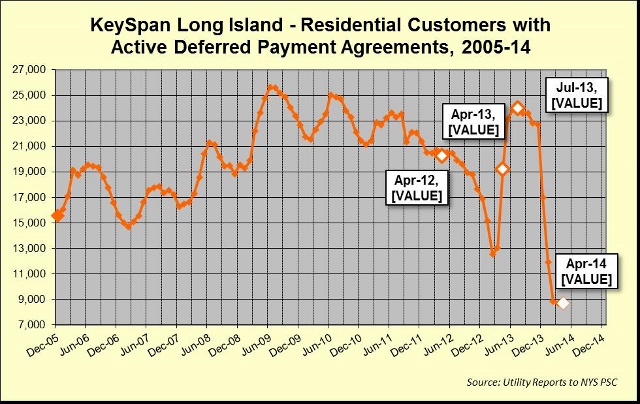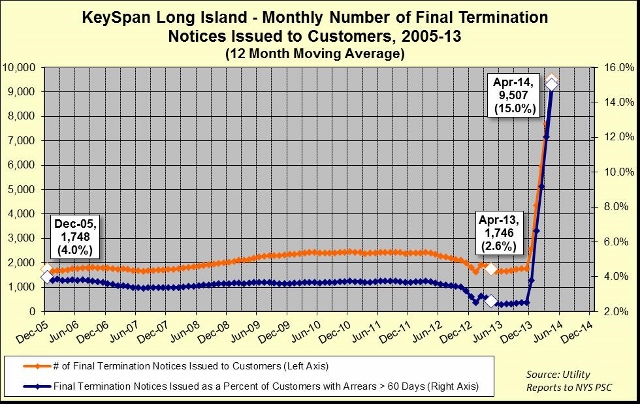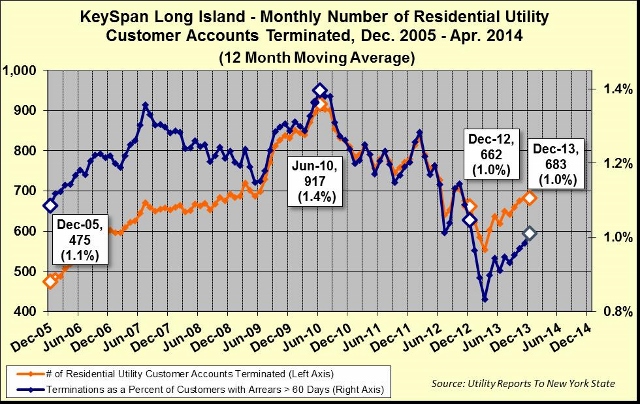Keyspan – Long Island (National Grid) Increases Utility Shutoff Measures After Closing Walk-In Customer Service Centers
Last year, Keyspan East Gas Corporation filed a proposal with the PSC seeking to eliminate all customer service assistance (except for taking payments) at eight of its eleven long island walk-in customer assistance offices which had been shared with LIPA when National Grid ran LIPA operations. In an update, Keyspan-LI said it would substitute customer service staff with a courtesy phone in 8 centers linked to their call center, which they also proposed to relocate, from Melville to Brooklyn. The remaining three customer service offices would have full walk-in customer service for just two more years, and after that, no commitment was made. The eight centers had provided about 43% of the walk-in customer services.The change was opposed by numerous public officials and by the utility workers union, which made a motion to stop the move pending a hearing, which seemingly is required by statute. The Utility Project also sought to intervene as a party but the Commission issued an Order denying the motion for a hearing without acting upon the Project’s intervention request. New York Public Service Law 65(13) requires “notice and hearing” prior to any relocation of telephone call centers by energy utilities or relocation of enumerated services provided at existing offices, including : “customer financial responsibility; receiving requests to initiate or terminate service; receiving requests for emergency services; determining deposit required or billing rate; receiving meter and service orders and access to meter requests; explaining company rates, regulations, policies, procedures, and common practices; initiating trouble order forms and high bill investigations; handling payment and other credit arrangements such as obtaining deposits, financial statements and payment plans; and referring customers to social service agencies and other assistance programs.” The statute further says “(b) No gas or electric corporation shall close a call center or other facility providing the customer assistance set forth in paragraph (a) of this subdivision or relocate such customer assistance to another area of New York state or outside of New York state without notice and hearing before the commission.” PSL §65(13)(b). Despite the seemingly clear language of the statute and the protests, the PSC held no hearing on the KeySpan Long Island request to close its Long Island call center, to relocate it to Brooklyn (in the service territory of an affiliate, KeySpan NY), and to eliminate direct face to face customer service to customers at eight of its eleven offices. Only a SAPA notice inviting written comments was issued by the PSC, and that notice indicated that no hearing was scheduled. The Commission denied the motion for hearings seemingly required by the plain language of the statute, stating: “we do not agree that the requested evidentiary hearings would more effectively provide input by interested parties, nor do we agree that the modification of services at the walk in centers constitutes closing or relocation in accordance with the statute.” Apparently replacing face to face services with a lobby phone to a call center at eight offices was not an office closing or a relocation of the service. Thus, even though words of the statute seemingly required the Commission to hold a hearing, the Commission did not hold one.
The Commission issued its order December 20, 2013.
In the aftermath of the call center relocation and reduction of walk-in customer services, in the first four months of 2014,
The number of customers with negotiated Deferred Payment Agreements, required to be offered and negotiable based on customer financial circumstances prior to shutoff, have plummeted:
The arrears more than 60 days late have skyrocketed:
The Number of Final Termination Notices (FTNs) issued to customers, threatening shutoff as a bill collection measure, has soared:
The number of customers whose service is interrupted for bill collection purposes is rapidly growing after a period of decline following the worst of the recession:
It is not clear what factors have led to the changes above. The closing of offices where customers can work out their payment issues face to face with customer service staff may have something to do with it. What is clear is that the goal of continuous residential service is not being met by KEDLI.
Gerald A. Norlander




